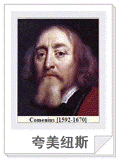夸美纽斯(J. A. Comenius)
——近代教育教学理论的奠基人之一(1592~1670) |
 |
夸美纽斯——捷克著名教育家,欧洲近代教育理论的探索者。生于磨坊主家庭。10岁时 父母双亡。22岁起就担任一所文法学校的校长、后又曾任“捷克兄弟会”(捷克的一个 民主教派.其成员多为贫苦农民、手工业者 和小商人。)的牧师和主教。他于1632年发表的《大教学论》被称为世界教育史上第一部系统的教育学理论巨著。该书对有关教育 的许多方面进行了系统的理论阐述。由于受到宗教世界观的影响,他对教育目的的看法是矛盾的,一方面他认为教育的目的是使人为来世生活做好准备,另一方面他又 |
认为教育要使人认识和研究世界上的一切事物,培养他们的各种能力、德行和信仰,使他们能享受现世的幸福。他高度评价教育的作用,认为教育不仅是改造社会、建设国家的手段,而且也是发展人的天赋、智力和完善自 身的必经之路。在教育的实施方面,他认为必须坚持教育要适应自然的总原则,同时,他还对教育过程中所要提倡的直观性原则、 学生学习的主动性自觉性原则、教育的系统性和循序渐进性原则、巩固性原则和量力性原则等都做了较全面的论证。在教育管理方 面他的突出贡献在于:他提出了统一学制的建议,把人认出生到24岁分为四个阶段(即婴儿期、儿童期、少年期和青年期,每期为 6年),并提出每个时期所应受的教育及所应上的学校,即母有学校(家教)、国语学校、拉丁学校和大学。他还为每种学校规定了广泛的教育内容。与此同时,他还第一个提出了学年制的主张,要求学校按学年进行招生和学生升级工作,各个学校同时开学,同时放假。他要求学校工作要有计划,每月、每日、每时都要有指定的工作,并且应按时完成这些计划。他还要求实行班级授课制,这对教育发展也是有着深远影响的。他一生著述很多,除了上面提到的以外,还有许多理论著作和教材等,其中主要有:《母育学校》、《泛智的先声》、《论天赋才能的创造》、《组织良好的学校的准则》、《世界图解》等。 |
Johann Amos Comenius (1592-1670) |
Johann Amos Comenius, or Jan Amos Komensky, was born in March 28th , 1592 in Nivnice (Czech Republic). His father's dead was in 1602 and his mother's in the following year. That's why he moved to his aunt in Stráznice in 1603 and before he went to the latin school in Prerau in 1608, which was finished in 1611. From 1611 till 1614 he studied at the universities of Herborn and Heidelberg. As teacher and principal, he taught and led his "own" latin school from 1614 till 1618. In 1616 he became priest and did his work from 1618 till 1621 as preacher and teacher in Fulnek. Cause of the Thirty Year War, which began in 1618, he had to change his places from 1621 till 1628, where he stood. A new country decree for M?hren was the reason, why he moved in 1628 to Lissa in Poland, where he stayed until 1641. Comenius was also from 1641 till 1642 in London and the Netherlands. From 1642 till 1648 he worked for Sweden and helped for the education reforms, but when he was elected bishop of the university, in the same year, and when the Thirty Year War was finished, he returned to Lissa in 1648. In the following two periods of ten years the Czech theologian and pedagogical reformer had to move very often. In 1650 he left Lissa to Sárospatak for four years and then came for two years to Lissa back. When Lissa was burned in 1656 he was escaping for 14 years to Amsterdam, where he had a quarrel with another theologian in 1669. Finally he died in Amsterdam in November 15th, 1670. Jan Amos Komensky was buried in Naarden, not far from Amsterdam. He supported the Christian education and the reforms of the school (pictures, not the teach of books), especially in the language instruction. He is best known for his contribution about teaching. A century before the Enlightenment, Johann Amos Comenius was a theologian, philosopher and pedagogue who believed that only through education could man achieve his full potential and lead a truly harmonious life. He was one of the founding fathers of modern education, and also a cosmopolitan and universalist who strove incessantly for human rights, peace between the nations, social peace and the unity of mankind. The choice of the name COMENIUS for this part of the SOCRATES programme is a reminder of Europe's rich educational heritage. |
